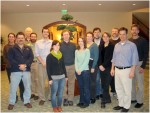Researchers from the Hubbard Brook (HBR) Long Term Ecological Research (LTER) program–John Campbell, Ruth Yanai and Mark Green–convened a workshop attended by 15 scientists in Boston, MA in March 2011 to discuss how to address uncertainty in calculating biogeochemical inputs and outputs at the small watershed scale. The project, “Quantifying Uncertainty in Ecosystem Studies (QUEST),” was funded by LTER and focused on estimating the uncertainty in annual hydrologic fluxes of elements across sites using multiple computational methods.
Monitoring nutrients in precipitation and streamwater from headwater catchments has greatly advanced our understanding of biogeochemical cycling. However, although inputs to and outputs from ecosystems are instrumental to understanding sinks and sources of nutrients and other elements, uncertainty in these fluxes is rarely reported in ecosystem budgets. Estimating uncertainty is essential to evaluating the significance of cross-site comparisons, which involve fundamental differences between ecosystem function across sites and differences in sampling and computational methods. We anticipate being able to recommend improvements to monitoring efficiency at some sites based on this analysis, as well as learning how the native controls on nutrient cycling works across sites.
The goal of this synthesis is to evaluate uncertainty in hydrologic inputs, outputs, and net hydrologic fluxes of major elements across small watersheds with diverse characteristics. The long-term goal of the project is to spur a cultural change in ecology to make uncertainty analysis an accepted and expected practice in constructing ecosystem budgets. We hope to provide ecologists working in a variety of ecosystems the theoretical and analytical tools to analyze uncertainty in many types of measurements, and increase awareness of the different methods for including uncertainty in ecosystem budgets. This approach gives researchers the ability to evaluate and improve monitoring strategies (e.g. the number and frequency of samples collected) and computational approaches (e.g. weighting concentrations by discharge).
We will use a cross-site approach to explore sources of uncertainty in catchment-scale elemental budgets for terrestrial ecosystems. Differences will be due both to biogeochemical and hydrological factors across systems (native variation) and also to the measurements and models applied (knowledge uncertainty). Our sites include a tropical rainforest (LUQ), a coniferous temperate rainforest (AND), an alpine site (NWT), and forests with a seasonal snowpack (HBR; Marcell Experimental Forest, MN; Sleepers River Research Watershed, VT; Biscuit Brook, NY) and without a snowpack (CWT; Fernow Experimental Forest, WV). All these sites have wet deposition (input) and streamwater export (output) data for small headwater streams.
The uncertainty analysis will be implemented using a Monte Carlo approach performed in R, a statistical computing environment. The R code that we develop will run in Kepler, a program designed to generate and execute scientific workflows. Both R and Kepler are freely available, open source software packages that can run on different computing platforms, making them widely accessible to researchers and students.
A working group formed during the workshop is planning to publish a number of papers in the coming years, ranging from in-depth quantitative comparisons of uncertainty among sites to commentaries highlighting the broader importance of addressing sampling and analytical error in watershed studies. To learn more about QUEST or how to implement uncertainty analyses at your site, feel free to visit the QUEST website, https://sites.google.com/site/quantifyinguncertainty, or contact us at quantifyinguncertainty@gmail.com.

 Enlarge this image
Enlarge this image